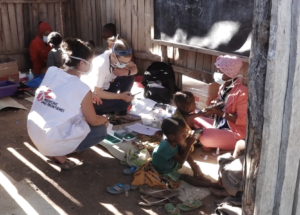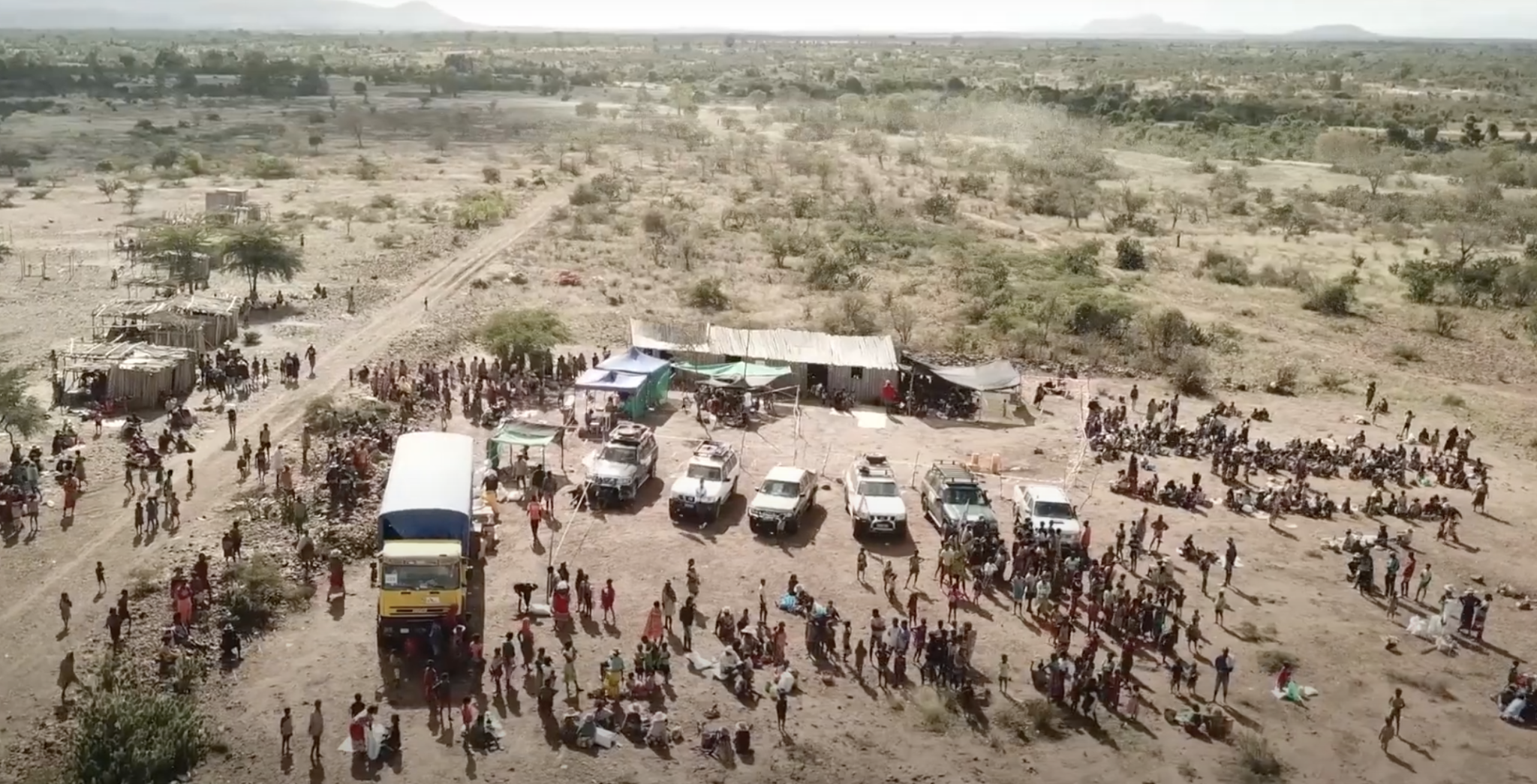ORISA® water purifier helps Médecins Sans Frontières teams in Madagascar combat malnutrition
Malnutrition is affecting more and more people. Indeed, food insecurity worsened worldwide in 2022. 258 million people needed emergency food aid, compared with 193 million in 2021. In remote areas or those hit by natural disasters, the situation is all the more critical, reinforced by a context of vital insecurity. Malnutrition particularly affects young children. In 2019, UNICEF published a “Children, Food and Nutrition” report which indicated that 1 in 3 children under 5 suffered from malnutrition.
Madagascar is the 5th most affected country in the world, with 47% of children under 5 (around 2 million children) affected by malnutrition, especially in rural areas. It is certain that this health situation also stems from the poor soil of this territory: “Madagascar suffers from drought and lack of rain. Crops are almost non-existent, even though they are vital for the population. The locals call it ‘kéré’, a term describing the lack of food and hunger”, explains MSF’s field teams.

©Médecins Sans Frontières – Distribution of ORISA® water purifiers
Not limited to foodstuffs, this spoilage is also directly linked to water shortages or the consumption of water of dubious quality. Many diseases, such as cholera, transmitted by contaminated water, also affect malnourished people. It is highly likely that insufficient access to drinking water, hygiene and sanitation is responsible for around 50% of malnutrition worldwide.
The Covid pandemic has also exacerbated this health problem in Madagascar, and has had a particularly adverse effect on the population of Elonty. For these reasons, Médecins Sans Frontières has set up a large-scale health operation to combat malnutrition.
Using mobile clinics and deployments within beneficiary families, they conducted a campaign to raise awareness, detect and treat malnutrition, with priority given to the very young, in order to alleviate the acute food insecurity that leads to health problems. Médecins Sans Frontières teams focused on identifying a solution to improve water quality in Anamazava, in the south of the country. However, as the population is not inclined to opt for technological solutions, it was not advisable to opt for a watertrucking solution, as it might be deemed difficult for beneficiaries to use. It was therefore in
The deployment of ORISA® water purifiers to provide safe drinking water in mobile clinics
In 2021, Médecins Sans Frontières turned to ORISA® water purifiers to meet this challenge. These are the most suitable water filtration systems, thanks to their reliability and ease of use and maintenance. What’s more, they present no risk of water contamination. The water inlet to be treated and the purified water outlet are not in contact. This is a definite advantage when it comes to improving the health of beneficiaries over the long term, so that they can regain their strength without their bodies having to contend with microbiological contamination.
The number of beneficiaries, the deployment zones, the quality of the water (turbidity) to be treated, the means to get there… These are the constraints that the Médecins Sans Frontières teams had to face and adapt to in order to bring this deployment to a successful conclusion. The filters were distributed in three phases.
The first deployment involved some fifteen kits, each consisting of an ORISA® water filter, a bucket with lid, a jerry can, a cup and 5 pieces of soap.
©Médecins Sans Frontières – Instagram story

©Médecins Sans Frontières – Mobile clinics in Madagascar
The kit was distributed to homeowners who agreed to share the filtered water with their neighbors. Distribution of the ORISA® purifiers and collective training of the beneficiaries took around 5 hours.
The aim was to demonstrate how ORISA® worked, followed by a short course on the risks associated with drinking unsafe water. The Médecins Sans Frontières teams on mission in Madagascar then carried out individual training in each household to explain in greater depth how to use and maintain the water filters.
A follow-up on the use of the purifiers was carried out following this first distribution, and positive feedback was shared by users. A second roll-out was therefore organized, and the distribution of kits to other households continued. The distribution format was the same, and this time the operation lasted 3 hours.
A few weeks later, the Médecins Sans Frontières teams returned to continue distribution throughout the village. Given the large number of beneficiaries, this distribution lasted 3 days, still using the same format as the first and subsequent operations.
To meet the needs of the population, 973 ORISA® water purifiers, combined with the other elements contained in the kits, were deployed to limit water-borne diseases and consequently the rate of malnutrition.
The positive impacts of this humanitarian and health project
This project run by Médecins Sans Frontières has many positive points. Through these distribution phases, the population has gained access to safe water over the long term. Thanks to this humanitarian intervention, many households benefit from water that is free from microbiological contamination for drinking water, food and hygiene. Médecins Sans Frontières noted in an end-of-intervention report that malnutrition rates had fallen, particularly among young people.
The ORISA® freshwater filtration system is an advantage for this population, as it does not require in-depth knowledge of the technology, and its manual use truly meets the needs of both aid workers and beneficiaries. It also helps to improve the health and living conditions of these people.

@Médecins Sans Frontières – Elonty village, deployment of ORISA® filters
In Madagascar, 81% of the population lives below the poverty line, and access to clean water is a luxury that not everyone can afford. This has an impact on the ability of Malagasy people to live in dignity and meet their basic needs. Following the distributions, beneficiaries expressed their satisfaction with the reduction in turbidity in drinking water. 973 households use their ORISA® water purifier every day for drinking and cooking. They use and maintain their water filter with care and autonomy.
Behind the scenes of the project in favor of drinking water in mobile clinics in Madagascar
Médecins Sans Frontières encountered a number of difficulties which did not, however, affect the positive return of the Malagasy from Elonty. The first difficulty was access to the site. Access to the village was very difficult, despite the field team’s 4×4 vehicles. Some roads were impassable by truck, making it very difficult to transport equipment. It took 7h30 to reach the Amboasary base, and more than 1 hour off-road.
In addition to a complex route, the team was confronted with erroneous demographic data. The number of kits did not correspond to the number of households in need. It was therefore necessary to go back and forth to meet the needs of these households. In addition, communication with the local population proved difficult without recourse to either French or Malagasy. As a result, understanding how the filter worked was more complex. Despite all these problems, the Médecins Sans Frontières teams succeeded brilliantly in helping this Madagascan population, reducing water-borne diseases and malnutrition.
“Le problème d’accès à l’eau demeure majeur. Nous apportons de l’autonomie aux personnes qu’elles soient en situation d’urgence ou de développement humanitaire.”


“Adapter et rendre abordables les technologies de filtration aux usages de chacun, pour relever les défis sociaux et écologiques de notre époque.”
Anthony Cailleau, représentant France des projets en Colombie, Directeur Général et co-fondateur de Fonto de vivo.Interlocuteur pour l’aide au développement et à la coopération internationale.

